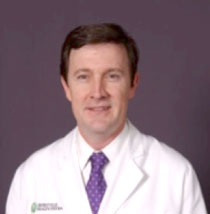About
Dr. Cobb received his bachelor’s degree in zoology from the University of Georgia and attended medical school at the Medical College of Georgia. He came to Greenville in 1998 to start his five-year residency in general surgery. Once completed in 1998, Dr. Cobb went to the Carolinas Medical Center in Charlotte, NC to perform a two-year fellowship in advanced laparoscopy. He returned to Greenville in 2005 to serve on the faculty and start a minimally invasive surgical service. In 2007, the Hernia Center was established at Prisma Health–Upstate. The mission is to advance hernia care in the Upstate with innovative techniques, perform continuous quality improvement through publishing outcomes data, and educate the patients and physicians in the pathophysiology of hernia and its treatment. Starting in 2009, Dr. Cobb’s partner, Alfredo Carbonell, MD and he established the first minimally invasive surgical fellowship in South Carolina. They have provided fellowship training in advanced laparoscopy and bariatric surgery for 10 trainees to date. Dr. Cobb is also an associate professor of clinical surgery at the University of South Carolina School of Medicine Greenville. Dr. Cobb’s research interests revolve around hernia disease. His basic science work has largely been in biomaterials for hernia repair. He has worked with Alexey Vertegel, PhD and Dmitry Gill on mesh implant projects at Clemson. The work has looked at improving the biocompatibility of meshes for hernia repair, as well as attempting to use coatings on mesh to improve ingrowth and resistance to infection. Another area of interest is advancing techniques in minimally invasive approaches to hernia repair. Their group has worked with the students in the DeFINE program under the leadership of John Desjardins, PhD. For more information, see his Curriculum Vitae.
How their research is transforming health care
Hernia is one of the most common disease processes that affects patients. Incisional hernia is the most common long-term complication of abdominal incisions, occurring up to 18% of the time. The lifetime risk of developing an inguinal hernia in a male is 25%. The vast majority of repair techniques for incisional and inguinal hernias involve mesh. Up until recently, very little was known about the biomechanics of the mesh materials that are used for hernia repair. Dr. Cobb’s interest in biomaterials for hernia repair began in his fellowship during his time with Todd Heniford, MD. He has continued his work to improve prosthetic materials for hernia repair during his time in Greenville. By better understanding the biocompatibility of mesh once it is implanted in the patient and looking at novel methods to enhance the properties of mesh to allow it to be better tolerated, Dr. Cobb and his colleagues are helping to improve the outcomes in one of the most commonly performed surgeries in the world.
Health research keywords
Biomaterials; Synthetic mesh; Hernia; Robotics; Haptics

